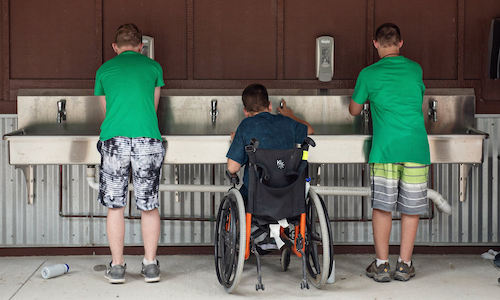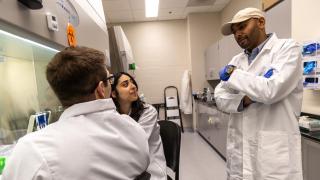
Times have changed — except at the American summer camp. Canoeing, archery and some version of a game where the object is to drench a kid in water are still the classics. But at North Star Reach, a metro Detroit camp serving kids with serious medical conditions, it often takes a little ingenuity to make sure all campers can get in on the fun.
For the past two semesters, UM-Dearborn mechanical and bioengineering seniors have been pitching in with that effort — designing adaptive technologies for campers with various physical needs. Coordinated by Professor Alan Argento, the senior design class took on three projects this past semester: One team, advised by Professor PK Mallick, designed a hoist to safely lift kids from a wheelchair into a canoe. A second group working with Assistant Professor Amanda Esquivel developed an archery stand that allows campers with various strength and stability issues to fire a bow and arrow. And a third team, overseen by Professor Eric Ratts, took on an ambitious idea that came directly from the camp director himself: An oversized version of the game Battleship, in which the kids are the ships and “hits” are registered with a bucket full of water raining down on their heads.
Mechanical engineering student Joey Springer says the battleship game, which was actually started by a previous senior design team back in 2018, was a pretty epic undertaking. That’s in part because of the sheer size: The design called for a 16-by-25-foot game board and a similarly large overhead trolley system to move the bucket of water around the board. The team sacrificed their entire spring break to build the prototype (which is roughly a sixth of the size). But it all felt worth it when a demo for the camp director went off without a hitch. Springer says despite the long hours and deadline pressure, it was by far his favorite project from his four years at UM-Dearborn.
Mechanical engineering student Marina Goocher, whose team designed the archery stand, also put the experience near the top of her all-time list.
“Part of that is that it felt really great to do something for these kids,” Goocher says. “But it’s also the most real-life engineering work I had the opportunity to do. There’s a client, they have certain design needs, and then it’s up to us to figure out how to make that happen. So it’s not just a class project or something you’re getting a grade on. It feels a little more meaningful when you’re building something that’s not just going to sit in a basement somewhere or end up in the trash.”
Quite the opposite, in fact. Goocher’s team hustled all semester, found some early success with their prototype, and were able to deliver a full-size, fully operational archery stand to the camp in late April. We have no doubt it will be the highlight of many a kid’s summer.
###
Twelve CECS students collaborated on North Star Reach projects this past semester. The accessible bow holder team included Marina Goocher, Nicholas Hitchcock, Victor Lenart and Timothy Poore; Josh Bylund, Madison Brinkman, Jacob Fox and Valeria Reyna-Altamirano worked on the canoe hoist; and the battleship team included Aaron Cooper, Westley Raney, Joey Springer and Olivia Willemsen.




